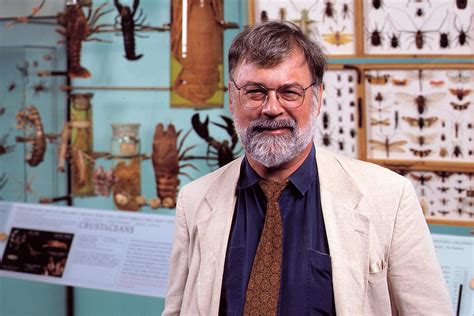A Quote by Carl Jung
Just as we might take Darwin as an example of the normal extraverted thinking type, the normal introverted thinking type could be represented by Kant. The one speaks with facts, the other relies on the subjective factor. Darwin ranges over the wide field of objective reality, Kant restricts himself to a critique of knowledge.
Related Quotes
Much of the geographical work of the past hundred years... has either explicitly or implicitly taken its inspiration from biology, and in particular Darwin. Many of the original Darwinians, such as Hooker, Wallace, Huxley, Bates, and Darwin himself, were actively concerned with geographical exploration, and it was largely facts of geographical distribution in a spatial setting which provided Darwin with the germ of his theory.
The 'OK Plateau' is that place we all get to where we just stop getting better at something. Take typing, for example. You might type and type and type all day long, but once you reach a certain level, you just don't get appreciably faster. That's because it's become automatic. You've moved it to the back of your mind's filing cabinet.
An atheist before Darwin could have said, following Hume: I have no explanation for complex biological design. All I know is that God isn't a good explanation, so we must wait and hope that somebody comes up with a better one. I can't help feeling that such a position, though logically sound, would have left one feeling pretty unsatisfied, and that although atheism might have been logically tenable before Darwin, Darwin made it possible to be an intellectually fulfilled atheist.
I could have just said I'm good at my job, but I didn't. Didn't want the police thinking I was holding out information when I wasn't. "I've got one advantage over a normal homicide detective, I expect it to be a monster. No one ever calls me in if it's just a stabbing, or a hit-and-run. I don't spend a lot of time trying to come up with nice, normal explanations. It means I get to ignore a lot of theories.
The Church demonstrated the falsity and folly of Darwin's theories by showing that they contradicted the Mosaic account of creation, and now that the theories of Darwin having been fairly established, the Church says that the Mosaic account is true because it is in harmony with Darwin. Now, if it should turn out that Darwin was mistaken, what then?
Kant argued that, where nature could be considered beautiful in her acts of destruction, human violence appeared instead as monstrous. However, a misreading of Kant in Romantic philosophy led to the idealization of the murderer as a sublime genius that has colored constructions of that criminal figure ever since.



































